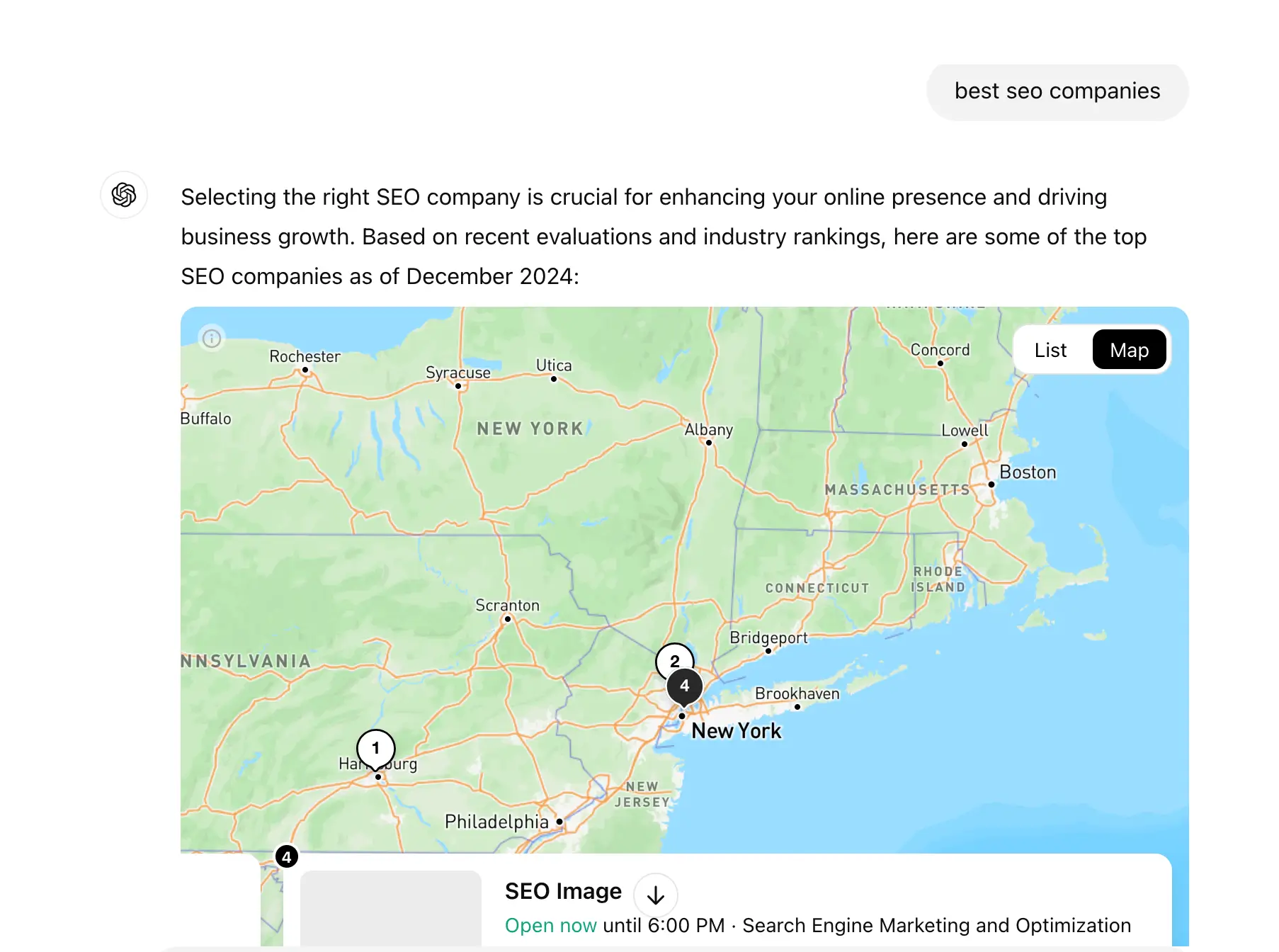For years, marketers have been locked in a never-ending game of cat and mouse with search engine algorithms, tweaking keywords, crafting metadata, and adding backlinks. It’s all been in the name of that elusive goal: climbing to the top of Google’s search results. But what happens when the rules of the game change entirely? Welcome to the era of Generative Engine Optimization (GEO), where AI search engines aren’t just shaping the way we search—they’re rewriting the playbook for SEO marketing altogether.
Let’s dive into how the landscape of online search is transforming to AI and what it means for marketers, SEOs, businesses, and even casual Googlers.
The AI Search Engine Revolution
For decades, Google has ruled the search engine world as a superpower. Its organic search algorithms, while complex, were designed to match keywords with content and popularity (authoritative) factors, giving us results that were meticulously ranked based on relevance, authority, and user experience signals. Enter artificial intelligence (AI) driven search engines like SearchtGPT, Google Gemini, and other Generative AI platforms. They’re not just trying to find existing answers; they’re creating new ones.
These generative engines are conversational, contextual, and capable of synthesizing massive amounts of information to deliver responses that feel tailored to you. They can answer questions, provide nuanced advice, or summarize information from multiple sources in real time. Unlike traditional search engines like Google, which might give you a list of links to sift through, AI search engines aim to provide you with the answer you’re looking for immediately.
And here’s the kicker: Google’s recent integration of AI-generated snippets and responses, which are prominently displayed above organic search results, shows a clear prioritization of AI answers over traditional ones. It’s a not-so-subtle hint that the future of search might not just involve algorithms. It could be led by AI. This levels the playing fields of the search superpowers. As ChatGPT’s new “SearchGPT” gains popularity and puts a big dent in Google’s dominance.
How Generative AI Changes User Behavior
Traditional search engines trained us to “search and scroll.” You’d type in your query, scan through pages of results, and click on links to find your answer. With AI search engines, that behavior is shifting. Instead of combing through multiple sources, users now engage with a single conversational interface that provides direct answers. Consider the difference between asking a librarian for book recommendations versus rummaging through library shelves yourself.
This change in user behavior has profound implications:
Reduced Clicks on Organic Results
If users get comprehensive answers directly from AI, they’re less likely to click on the links below. This means publishers that create great content are losing search traffic. A 100% negative for the world and a positive for the Engine, as users may not leave the engine and read the full articles. This can cause significant issues for publishers.
Higher Expectations for Personalization: AI search engines can adapt to user preferences, making their answers feel highly relevant. This raises the bar for what users expect from search experiences. That is, if the AI has accurate information, and since generative engines like Gemini and SearchGPT seem to get it right most of the time, there’s still a risk of misinformation from pulling data from multiple sources, Which is partially how AI engines work.
Fewer but More Targeted Interactions: Users might spend less time searching but more time engaging deeply with the content provided by the AI, or they may never click through to the publishers,
For businesses, this means traditional SEO strategies may no longer cut it. Enter Generative Engine Optimization.
What Is Generative Engine Optimization?
Generative Engine Optimization (GEO) is the practice of optimizing your content to rank well within AI-generated responses. It’s the next evolution of SEO, tailored to how AI engines synthesize and present information.
While traditional SEO relies heavily on keywords, backlinks, and technical site optimizations, GEO focuses on:
- Conversational Tone: Since AI engines generate content conversationally, your content needs to mirror this tone to increase its chances of being referenced.
- Structured Data and Context: AI engines thrive on structured information that’s easy to parse and understand. Providing clear, concise, and well-organized content makes your site more AI-friendly.
- Authority Beyond Links: AI models often prioritize expertise and authority over the sheer volume of backlinks. Demonstrating credibility through in-depth, well-researched content becomes critical. This is a foundational change to traditional SEO link building.
- Direct Answers: Content that directly answers specific questions in a clear and succinct manner is more likely to be favored by AI search engines. As an example, the same way this article answered: “What is Generative Engine Optimization?” Generative Engine Optimization is….. Now, you have just learned How To Implement Generative Engine Optimization strategies.
GEO isn’t just about tweaking existing SEO strategies; it’s about rethinking them entirely to cater to a new paradigm. This makes a seasoned SEO who also understands GEO ranking strategies far more valuable than outdated SEO service providers.
The GEO Marketing Landscape: Opportunities and Challenges
AI-driven search engines, like Google Gemini and SearchGPT, open up new opportunities for businesses while also presenting unique challenges.
Opportunities
- Smaller Websites Can Compete: Traditional Search Algorithms often favor larger sites with massive backlink profiles. GEO, a smaller website that provides highly relevant, authoritative answers, has a better chance of appearing in AI responses if properly optimized
- Enhanced Visibility: Businesses that successfully optimize for AI engines can enjoy unparalleled visibility since AI responses often pull content from multiple sources and give clear attribution.
- New Service Ecosystems: The rise of GEO has already sparked the emergence of Generative Engine Optimization services companies like SEO Image. These firms specialize in helping businesses navigate the complexities of AI search engines, offering tailored strategies to stay competitive.
Challenges
- Decreased Organic Traffic: If AI answers dominate the top of the page, traditional organic results may see a significant drop in traffic. Businesses must adapt quickly or risk losing visibility.
- Content Quality Pressure: AI engines scrutinize content for accuracy, relevance, and depth. Low-quality content will no longer fly under the radar, and the link value will be dramatically reduced; you can’t fool an AI engine.
- Unpredictable Algorithms: Just like traditional SEO, GEO strategies must constantly evolve to keep up with the rapid pace of AI advancements and spam. However, it’s harder to spam an AI engine than to spam a traditional search engine.
The Battle Between AI and Traditional Search
One of the biggest indicators of AI’s growing dominance is Google’s decision to place AI-generated results above organic ones. Think about that for a second. This is the same Google that spent decades perfecting its search algorithms, only to now suggest that AI might be a more effective way to deliver results.
Why the shift? The answer lies in user satisfaction. AI-generated results provide:
- Contextual Understanding: AI engines don’t just match keywords; they understand intent and context, delivering answers that feel intuitive and precise.
- Time Savings: Users get instant answers without the need to click through multiple pages.
- Human-Like Interactions: AI models can respond conversationally, creating a more engaging and personalized experience.
However, this doesn’t mean that traditional search is dead. Instead, we’re likely moving towards a hybrid model where AI responses complement, rather than replace, organic results. Businesses will need to optimize for both to stay ahead. So it’s essential to use a marketing agency that understands both.
How to Future-Proof Your SEO Strategy
So, how can businesses prepare for the rise of AI search engines and GEO? Here are some actionable tips:
- Audit Your Content for AI Compatibility: Review your existing content to ensure it’s structured, authoritative, and easy to understand. Focus on providing clear answers to common questions.
- Embrace Conversational Formats: Create content that mimics natural language patterns, such as FAQs, how-to guides, and conversational blog posts.
- Invest in Authority Building: Position your brand as an expert in your field through thought leadership, in-depth research, and high-quality content.
- Leverage Structured Data: Use schema markup to help AI engines better understand your content.
- Collaborate with GEO Experts: Consider partnering with generative engine optimization services companies to gain insights and strategies tailored to AI search engines.
- Stay Adaptable: AI technology evolves rapidly. Keep up with trends, experiment with new approaches, and be prepared to pivot as needed.
Hire an agency specializing in traditional SEO and modern GEO services, like SEO Image.
Look at our AI results from SearchGPT for “Best SEO Company“:
The Road Ahead
The rise of AI search engines and Generative Engine Optimization marks a new chapter in the world of online search and online reputation management. It’s an exciting, transformative time, but it also requires marketers and businesses to adapt—and fast. Whether you’re a seasoned SEO professional or a small business owner, the key to thriving in this new landscape lies in understanding the unique demands of AI search engines and tailoring your strategies accordingly.
Generative AI isn’t just a tool; it’s a revolution. And while it might feel daunting to start over with GEO, remember this: every revolution brings with it opportunities for those who are willing to evolve. So, buckle up, embrace the change, and get ready to optimize for the future of search.



